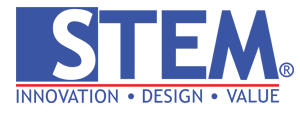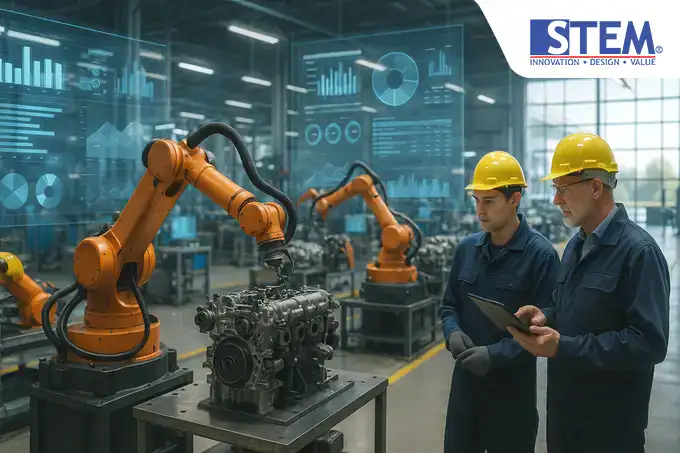The Indonesian automotive industry is a colossal force in constant motion. From car assembly plants to precision component manufacturers, its supply chain is vast, intricate, and ever-evolving.
Yet behind this momentum lie formidable challenges: production delays due to unsynchronized materials, the intricacies of managing a global supply chain, inefficient stockpiling of components, and relentless pressure to meet stringent international compliance standards.
Every production manager, component factory owner, or supply chain director is well acquainted with these pain points. But imagine a centralized platform capable of untangling this web, providing end-to-end visibility from raw materials to vehicles leaving the showroom, while optimizing every process for maximum efficiency.
This is precisely the role of **SAP Business One for the automotive industry**. Far more than a mere accounting program, this ERP solution acts as the central nervous system designed to confront the sector’s unique challenges. Let us explore how this automotive ERP in Indonesia can become the driving engine propelling your business to the next level.
What is SAP Business One for Automotive?
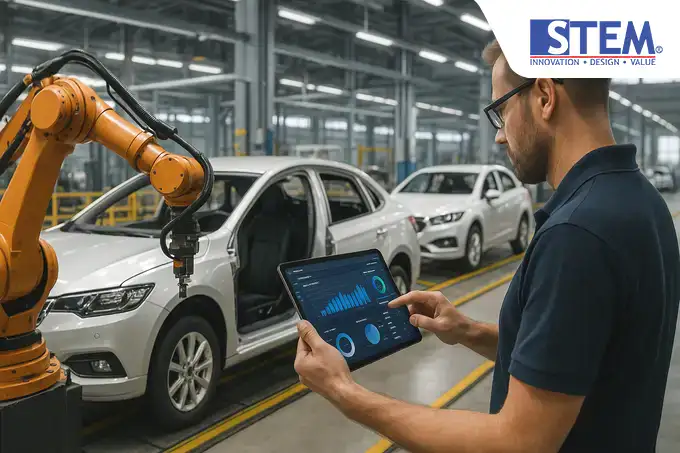
For many business leaders, SAP is synonymous with ERP for large corporations. However, **SAP Business One (SAP B1)** is a solution specifically engineered for small to medium-sized enterprises seeking the power of SAP in a more agile, cost-effective package.
**So, what exactly is SAP Business One for Automotive?**
In essence, it is SAP B1 configured with specialized modules tailored to address the demands of automotive manufacturing and distribution.
The distinction from generic ERP systems is significant:
- Generic ERP: Primarily focused on basic workflows such as accounting, sales, and procurement, often offering only limited manufacturing capabilities.
- SAP B1 for Automotive: Purpose-built with a deep understanding of automotive processes. It “speaks” your industry’s language: intricate Bill of Materials (BOM) for assembly, Material Requirement Planning (MRP) for thousands of components, traceability across serial and batch numbers, and seamless integration spanning production floors, spare parts warehouses, and distribution to dealers and workshops.
This is not about forcing a generic system to fit, but about deploying a solution designed for your ecosystem.
Key Challenges Facing the Automotive & Component Industry
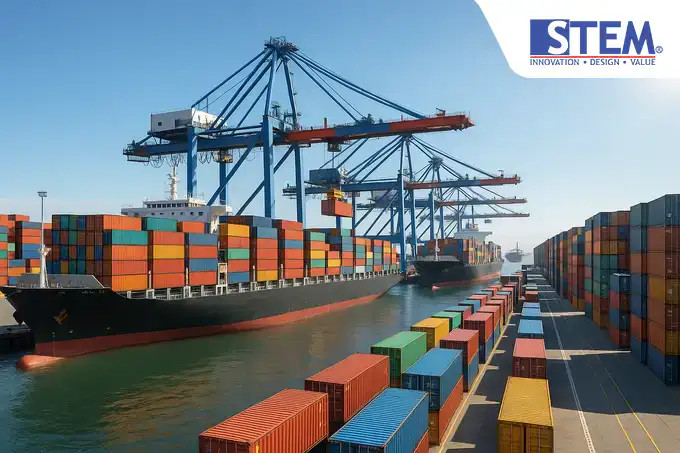
To appreciate the value of a solution, one must first understand the problems it resolves. Indonesia’s automotive industry, despite its immense potential, wrestles with at least four critical obstacles that hinder profitability and growth.
a. Global Supply Chains & Import Dependency
A large portion of vital components are still imported from abroad. This exposes businesses to currency fluctuations, shipping delays, import regulation shifts, and the complexities of coordinating with dozens of global suppliers.
Without an integrated system, gaining a comprehensive overview of material status and potential risks becomes nearly impossible.
b. Inventory & Raw Material Management
Component factories handle thousands of SKUs, from tiny bolts to raw engine blocks. The challenges include:
- Overstocking: Holding excess slow-moving items ties up working capital.
- Stockouts: A shortage of a single critical part can halt entire production lines, causing severe losses.
Balancing both ends without real-time visibility is almost unachievable.
c. Quality, Compliance & Traceability
The automotive sector adheres to stringent standards (e.g., IATF 16949). Every product must be traceable back to its raw material batch, production machine, and operator.
In the event of a recall, companies must swiftly identify affected units. Manual tracking with spreadsheets is prone to human error and highly time-consuming.
d. Price Pressure & Slim Margins
Competition in this industry is fierce. Manufacturers are constantly pressed to offer competitive prices to OEMs or the aftermarket. Without accurate costing and strict operational control, margins can erode rapidly.
Conquering these challenges demands more than diligence; it requires intelligent, integrated tools.
Core Features of SAP Business One: The Answer to Every Automotive Challenge
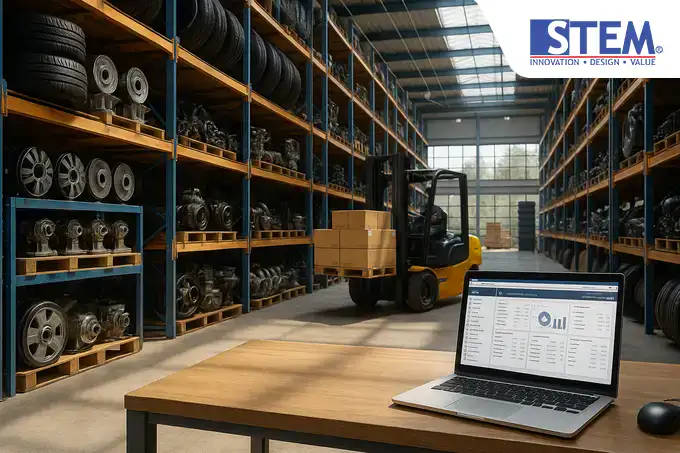
This is where SAP Business One reveals its true strength. Each module is designed to address specific issues on your production floor and across operations. Below are its key features and real-world applications:
a. Production Management & BOM (Bill of Materials)
Automotive BOMs can be highly complex, often with multiple levels of sub-assemblies.
- Feature: SAP B1 enables you to create detailed multi-level BOMs, capturing every component, sub-assembly, labor, and machine resource required to produce a finished product.
- Example in a Component Factory: A wheel manufacturer can establish a BOM that includes raw materials (aluminum ingots), processes (melting, casting, machining, painting), and additional components (valves, bolts). Any design modification can be updated seamlessly in the system, ensuring production always follows the correct formula.
b. MRP (Material Requirement Planning)
The intelligence behind production planning. SAP B1’s MRP ensures the right material is available at the right time.
- Feature: The MRP Wizard analyzes sales orders, minimum stock thresholds, and demand forecasts. From this, the system automatically recommends when to create production orders and when to procure raw materials.
- Optimization Example: Upon receiving an order for 5,000 oil filters, MRP reviews stock levels for filters, filter paper, and metal casings. If supplies are insufficient, it instantly generates purchase recommendations from Supplier A for filter paper and Supplier B for casings, accounting for lead times so materials arrive just in time for production.
c. Inventory & Warehouse Management
Managing thousands of fast-moving spare parts and components is a daunting task.
- Feature: SAP B1 offers real-time visibility across multiple warehouses (raw materials, work-in-progress, finished goods). The bin location function pinpoints exact physical item locations, expediting picking and packing processes.
- Example in a Spare Parts Warehouse: A warehouse staff member receives a request for 100 brake pads. By scanning a barcode, the system instantly identifies that 70 units are in Rack A-01 and 30 units in Rack C-05, eliminating manual searching.
d. Quality Control & Traceability
Ensuring compliance with automotive standards becomes far more manageable.
- Feature: Manage serial and batch numbers for every inbound component and outbound product. Quality checks can be integrated at every production stage.
- Compliance Example: If a defective piston batch is reported, entering the batch number into SAP B1 instantly reveals when it was produced, which raw materials were used, which machine manufactured it, and which distributors received it. Product recalls are executed swiftly and accurately.
e. Finance & Costing
Financial health underpins sustainable growth. SAP B1 consolidates all operational data into its finance module.
- Feature: Every material consumed, operator’s working hours, and machine runtime logged in production modules are automatically calculated to generate precise cost per unit.
- Margin Control Example: Management can easily compare cost of goods sold (COGS) against selling price for each product. If Product A shows narrowing margins, they can promptly investigate whether the cause is rising raw material costs, production inefficiency, or other factors, then take corrective action.
Tangible Benefits of SAP Business One for Your Automotive Business
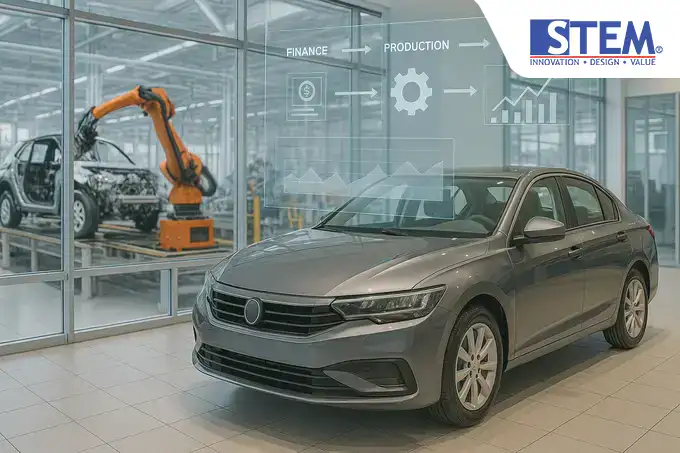
The right ERP implementation in the automotive sector is no longer a mere expense but a strategic investment. Its benefits are long-term and permeate every aspect of your operations.
- Enhanced Production Efficiency: With accurate MRP and well-structured production schedules, downtime due to material shortages can be drastically minimized. Workflows become smoother, and output rises significantly.
- Real-Time Supply Chain Visibility: Eliminate guesswork on order or stock status. Every stakeholder, from procurement to sales, has access to the same accurate data—empowering faster, more proactive decision-making.
- Reduced Operational Costs: Improved inventory management lowers storage costs. Smarter purchasing strategies lead to better supplier negotiations. Accurate costing ensures competitive yet profitable pricing.
- Improved Quality & Compliance: Structured quality control processes combined with robust traceability capabilities guarantee your products meet stringent industry standards. This not only safeguards customer trust but also reduces the financial impact of costly recalls.
- Scalability for Growth: As your business expands—whether by adding new production lines, opening additional plants, or acquiring new entities—the architecture of SAP Business One is built to scale seamlessly alongside your growth.
Integrating SAP Business One with Automotive 4.0 Technologies
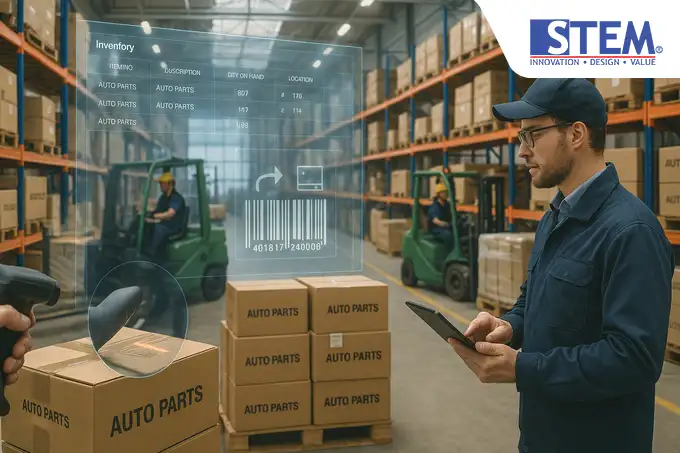
Digital transformation in the automotive industry is inevitable. SAP Business One is architected to embrace Industry 4.0 with ease.
- IoT & Production Sensors: Sensors on CNC machines or assembly lines can be linked to SAP B1. Data such as production counts, machine temperatures, or potential breakdowns flow in real-time, automatically triggering maintenance orders when needed.
- Integration with MES (Manufacturing Execution Systems): If your factory already employs MES for detailed production-floor control, SAP B1 integrates seamlessly. SAP B1 manages the planning (the “what” and “why”), while MES handles execution (the “how”), with synchronized data between the two.
- Advanced Analytics with SAP HANA: Opting for SAP HANA as your database provides lightning-fast transactions as well as sophisticated analytics and dashboards. This empowers real-time insights into production trends, supplier performance, and product profitability, fostering data-driven decisions.
Case Studies: Real-World Success Stories
While client details remain confidential, we can examine real examples of successful SAP Business One implementations in Indonesia’s automotive sector.
Case Study 1: Two-Wheel Spare Parts Manufacturer
- Challenge: Difficulty tracking thousands of small components, frequent stockouts halting chain and gear production, and challenges in calculating accurate COGS.
- Solution: Deployment of SAP B1 with emphasis on Production (BOM & MRP) and Inventory Management modules.
- Results:
- Inventory accuracy improved from 75% to 98%.
- Stockout incidents reduced by 90%.
- Management gained precise profitability analysis per product, allowing focus on the most profitable items.
Case Study 2: Import Distributor of Automotive Components
- Challenge: Long import lead times complicated demand forecasting, often resulting in overstocking of some items and shortages of fast-selling ones.
- Solution: Implementation of SAP B1 with customized Procurement, Sales, and MRP modules to strengthen forecasting.
- Results:
- Forecast accuracy increased by 30%.
- Inventory turnover improved, freeing up working capital tied to dead stock.
- Order processing times reduced by 40%.
Pricing & Implementation Costs of SAP Business One for Automotive
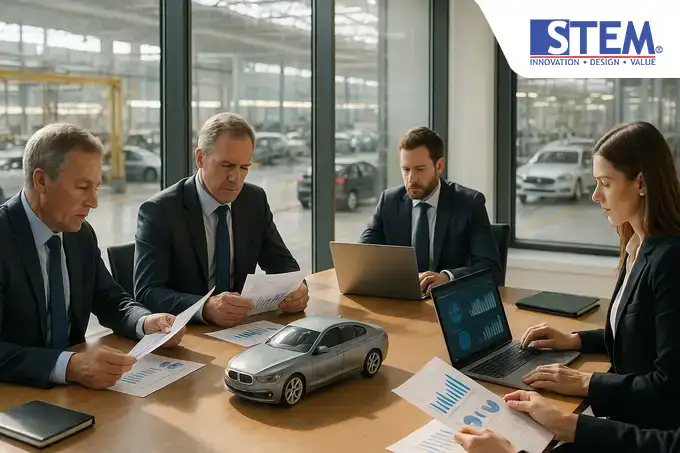
One of the first questions asked is: “What will it cost?” The honest answer is: it varies. The price of SAP Business One for automotive is not a one-size-fits-all product.
Key factors determining ERP implementation costs include:
- Number of Users: How many employees will access the system, and what type of licenses (professional, limited) are required.
- Modules Required: Whether you only need core modules (Finance, Sales, Purchasing, Inventory) or advanced ones (Production, MRP, Project Management).
- Database Selection: Choosing between Microsoft SQL Server (standard) or SAP HANA (for high-performance analytics).
- Customization & Integration Level: Whether SAP B1 needs to integrate with existing systems (e.g., attendance machines, custom barcode systems).
Rather than viewing it as a cost, consider its value. Think of the losses from manual processes: production stoppages, working capital tied in excess inventory, and missed opportunities from delayed decision-making.
Often, a well-executed ERP implementation achieves Return on Investment (ROI) within 18–36 months through efficiency gains and cost savings.
Demo & Choosing the Right SAP Business One Automotive Consultant
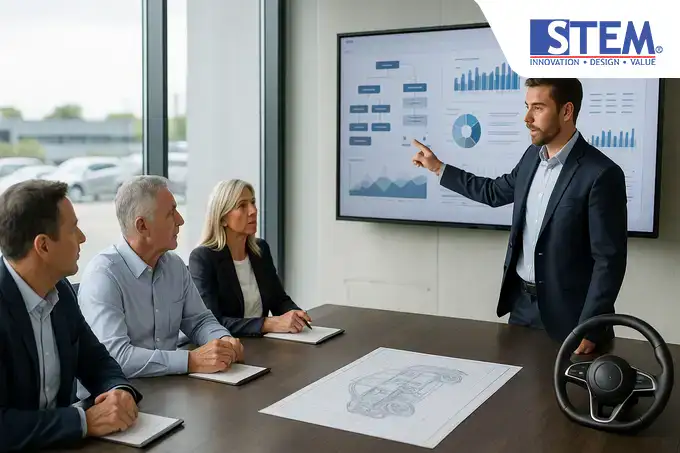
Seeing is believing. The most effective way to understand how SAP B1 can transform your business is by requesting a customized automotive demo aligned with your processes.
Yet even the most powerful software is futile without a capable implementation partner. Selecting the right SAP automotive consultant in Indonesia is crucial for success. An experienced partner does more than simply install software; they will:
- Possess deep insight into the automotive industry.
- Analyze your business processes to deliver optimal recommendations.
- Provide effective training tailored to your team.
- Offer responsive post-implementation support.
This is where PT. Sterling Tulus Cemerlang (STEM) excels. As a trusted SAP consultant in Indonesia, Sterling Team (STEM) has a proven track record in deploying SAP Business One across diverse manufacturing enterprises, including those within the complex automotive sector.
The Complete Solution: SAP Global, SAP B1, Sterling Team & iReap
It is important to recognize where SAP Business One stands within the larger SAP ecosystem. While SAP Global provides ERP solutions tailored to multinational giants, **SAP Business One Automotive Indonesia** offers the perfect balance of advanced features, scalability, and total cost of ownership for most local enterprises.
At Sterling Team (STEM), our solutions go beyond the factory floor. We understand that the automotive supply chain culminates at the consumer level.
That is why we also deliver iReap ERP, a reliable Point of Sale (POS) system for retailers such as dealers and workshops. By integrating SAP B1 at the distributor/manufacturer level with iReap at the retail front, you achieve a seamless digital ecosystem spanning the entire value chain.
FAQ: Frequently Asked Questions
What is SAP Business One for the automotive industry?
SAP Business One for automotive is an ERP system designed specifically for manufacturing and distribution companies in the automotive sector.
It unifies all core business processes—production (BOM, MRP), inventory management, quality control, procurement, sales, and finance—within a single centralized platform to boost efficiency and visibility.
Which SAP Business One modules are relevant to automotive manufacturing?
Key modules include: Production Management (Bill of Materials and Production Orders), Material Requirement Planning (MRP), Inventory & Warehouse Management (with serial & batch tracking), Quality Management, Sales & Procurement, and Accounting & Finance for accurate costing.
What is the cost of implementing SAP Business One in an automotive factory?
Costs vary depending on factors such as the number of users, modules required, database selection (SQL vs HANA), and the degree of customization.
For an accurate quotation, the best approach is consulting directly with an official partner like Sterling Team (STEM) for a detailed business analysis.
What advantages does SAP Business One hold over other ERP solutions for automotive?
Its foremost strengths are robust integration, scalability, and globally validated functionalities adapted to local needs.
Its MRP, traceability, and costing capabilities are highly reliable for the complexities of the automotive industry. Additionally, as a SAP product, it ensures long-term support and continuous innovation.
Is SAP Business One suitable for medium-scale spare parts factories?
Absolutely. SAP Business One was built for SMEs and mid-market enterprises. It delivers the power and best practices of world-class ERP in an affordable, quicker-to-deploy package—an ideal choice for spare parts manufacturers striving to grow and professionalize operations.
Take Full Control of Your Automotive Business Today!
Stop patching your business processes with scattered spreadsheets and disconnected systems. It is time to embrace an integrated platform designed to help you thrive in the highly competitive automotive industry.
The expert team at PT. Sterling Tulus Cemerlang (STEM) is ready to assist you.
- Request a SAP B1 Automotive Demo: Schedule a free demo session to witness firsthand how SAP Business One can resolve your company’s specific challenges.
- Free Consultation with Sterling Team: Discuss your needs, challenges, and business objectives with our experienced consultants at no cost.
- Explore iReap ERP for Your Dealerships & Workshops: If you manage retail networks, discover how iReap can streamline your point-of-sale operations.
Do not let competitors gain the upper hand. Reach out to Sterling Team (STEM): Your Official SAP Business One Partner today and embark on your digital transformation journey.
